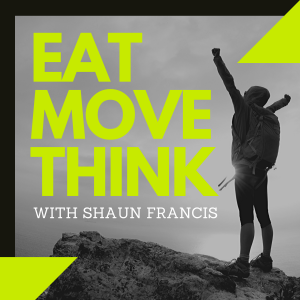Miscellaneous
Those who are focused on optimal longevity tend to be obsessed with diet and exercise. But what if something else is as important, if not more important, to living a long and healthy life? That’s the argument science journalist and bestselling author Marta Zaraska makes in her book Growing Young: How Friendship, Optimism and Kindness Can Help You Live to 100. As it turns out, having a strong, supportive social network is key to our longevity — in fact, Zaraska says it can lower your mortality risk by 65 percent, which is more than both diet and exercise. On this week’s episode, Zaraska joins host and Medcan CEO Shaun Francis to discuss her findings. https://www.eatmovethinkpodcast.com/podcast/ep-71-growing-young-with-marta-zaraska LINKS Marta Zaraska can be found on Twitter and over on her website. You can buy Growing Young here. You can also check out her previous book Meathooked, about the history and science of our cultural obsession with meat, here. Read an article Zaraska wrote on kindness for the BBC here, and then watch her discuss the ideas in her book on The Social. Also sit down with this recent New York Times feature, which explores how to navigate your friendships in a post-pandemic world. INSIGHTS Zaraska knows that when she talks about how friendship and kindness are essential to our long-term health, it can be easy to dismiss it as “New Age-y” fluff, but science and data backs this up. While working on her book, Zaraska read hundreds of research papers and interviewed many scientists and discovered that having a strong social network can reduce your risk of mortality by an impressive 65 percent. Diet and exercise, on the other hand, lowers it by 20 to 30 percent. “You still want to eat healthy and exercise,” says Zaraska. “But if you’ve completely forgotten about the social and mental side, then you’re definitely missing a huge opportunity to become healthier and live longer.” [2:38] So what are some of the actual health benefits we get from our relationships? Holding hands or hugging someone boosts oxytocin — the stress-reducing “love” hormone — and serotonin, which can lower our inflammation levels. Social connection can also give us endorphins, which are not only natural painkillers, but also encourage us to trust people more. There’s even evidence that being surrounded by others can decrease levels of the stress hormone cortisol, which is tied to inflammation and has been linked to a number of illnesses, like cardiovascular disease, cancer and diabetes. [6:34] If you take away just one thing from Zaraska’s book, it should be that romantic love, especially, plays an important role in our health and longevity — a romantic relationship alone can reduce your mortality risk by 45 percent. Typically, they’ll lower our stress levels and make us feel safe and cared for. That said, studies show that women need to feel like they’re in a high-quality romantic partnership to experience the health benefits, while men can still get them in a lower-quality relationship. [10:54] The pandemic, and lockdowns, have had a detrimental impact on our relationships and overall health. Not only were we missing out on the hormonal benefits of being around people, many of us have also felt isolated and lonely — something that can be connected to things like increased blood pressure and cancer. “Even if we didn’t come down with the virus itself, the whole stress of [the situation] was certainly not beneficial to our health,” Zaraska says. [17:25] It’s not just about our relationships either — being kind is also good for our health and longevity. “Evolution rewards us for being good team players in our tribe,” Zaraska explains. Acts of kindness, whether it’s helping your friends or mowing your elderly neighbour’s lawn, can calm our stress levels. One study even found that a group of people who performed random acts of kindness everyday for six weeks had a different gene expression in their white blood cells, which were more protective against inflammation. Even something like donating money to charity has health benefits. [19:32] You know what they say: Practice makes perfect. Empathy is, in part genetic, but it can be improved upon — just like your fitness levels can improve by exercising more. Studies show that reading or watching emotionally charged books and movies can help our empathy levels grow. Zaraska suggests even doing a simple exercise where you spend a few minutes trying to see the world from another person’s point of view. [22:06] Zaraska suggests paying as much attention to how you eat as what you eat. The Mediterranean diet is the gold standard, but we fixate too much on its actual contents. Zaraska currently lives in France, where eating is a leisurely, communal experience, similar to how meals occur in Spain and Italy. Both the type of food, and the social act of eating, provide health benefits. “If you eat a Mediterranean diet, even the best one, alone in your car on the way to work, it’s not going to have the same benefits as the way it [will] if you [spend] two hours sitting at a table with your friends and family,” she says. “It’s a very different story.” [28:06]

